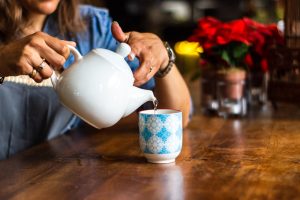The name for fresh ginger in TCM is Sheng Jiang and its medicinal uses were first recorded in 500 CE by Tao Hong-Jing in his Miscellaneous Records of Famous Physicians, which indicates that its use far predates Mr. Hong-Jing’s work. This spicy root has too many benefits to list, but we’ll give it a try anyway!
The Many Health Benefits of Ginger
Whether taken in the form of a hot tea or added to your cooking, fresh ginger is a potent medicine for all the following:
In its fresh form (Sheng Jiang)…
Cold & Flu
Best used at the earliest stages of cold or flu symptoms, fresh ginger is a natural antibiotic that works to dispel what is known in TCM as wind-cold and induce sweating in order to clear the pathogen. It can be used alone or in combination with other herbs for synergistic effect. Not symptomatic, but want to ward off a cold or virus before they can take hold? Ginger can help with that, too! Drink ginger tea if you’ve been in contact with someone who is sick or as a general preventative during cold & flu season.
Vomiting, Nausea
Referred to as the Middle Jiao in TCM, the core of digestion consists of the Spleen and Stomach. When these organs are out of harmony, this can often result in nausea and vomiting. Drinking ginger tea can warm the Middle Jiao in order to restore balance to the gastrointestinal system and bring an end to the upset. It can also be combined with other herbs to address certain underlying causes, on which your practitioner can guide you.
Lung Issues & Coughing
The warming effect of ginger can benefit the Lungs, too. When phlegm builds up and disrupts the Lung qi, ginger can be an excellent palliative to dispel cold and stop coughing.
Food Poisoning
Ginger has detoxifying properties, which are very effective for clearing the body of food poisoning, especially from seafood such as shrimp and crab. It is also used in combination with other herbs to eliminate their toxicity and reduce unwanted side effects in certain herbal formulas.
Cardiovascular
Ginger’s warming properties have been known to increase the heart rate, respiration rate and blood pressure. This can be very beneficial for the lungs and heart, as well as to aid with low blood pressure. Of course, caution should be taken for those with high blood pressure, though!
Side Effects of Cancer Treatment
For those undergoing Chemotherapy and/or Radiation, Ginger tea is recommended before and during treatments in order to help protect the body from the toxic side effects of these treatment methods.
In its dried form (Gan Jiang)…
Though the properties can be similar to the above, dried ginger is its own unique substance and therefore has a couple different attributes. Like its fresh counterpart, it can also help to warm the Middle Jiao and ease digestive troubles, as well as warm the Lung and dissolve phlegm. However, it is additionally helpful for the following:
Stops Bleeding
When bleeding is the result of deficiency or cold, as determined by your practitioner, but which is characterized by dark, thin blood, your practitioner might recommend dried ginger to alleviate the issue. Some example diagnoses that warrant this include hematemesis, hematochezia, hypermenorrhea, and abnormal menstrual bleeding.
Dispels Cold & Dampness
Cold and Dampness are specific conditions in TCM that arise from certain imbalances within the body. These can often manifest as a feeling of heaviness, cold or pain in the lower body, which dried ginger can help to resolve.

How To Make Ginger Tea At Home
First, purchase fresh ginger root in the produce section of your local grocery store. When you get it home:
- Rinse the root
- Slice off pieces of at least 2 inches (4 cm)
- Place the pieces in a small pot or tea kettle
- Add desired amount of water* and bring to a boil
- Steep the ginger for 7-10 minutes
- Let cool before drinking
*Use more ginger if making a large pot
When drinking your tea, be sure to sip – savor the ginger and all its medicinal properties! You can reheat as necessary to warm the tea and drink throughout the day.
Don’t have time or energy to make your own homemade tea? No worries – we have ginger tea available in the clinic!
The Importance of Consulting Your Practitioner
There are certain cautions that should be observed when taking any medicine – even herbs. Because ginger is warm and acrid, it is not appropriate for patients with yin deficiency, excess heat, or spontaneous perspiration due to qi deficiency.
If you are experiencing any of the issues mentioned above and are wondering if ginger is right for you, give us a call or book an Herbal Consult online today!
Source: John K. Chen & Tina T. Chen. Chinese Medical Herbology and Pharmacology. Art of Medicine Press, 2001.

